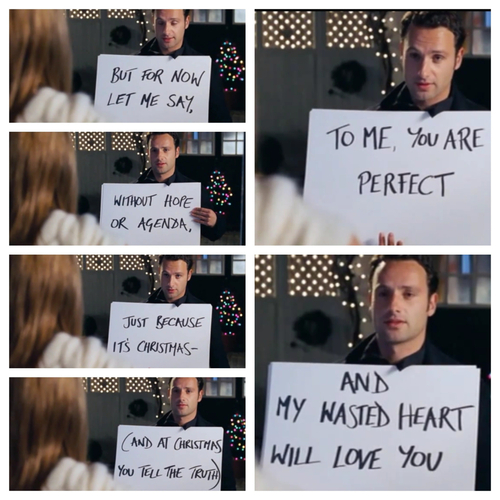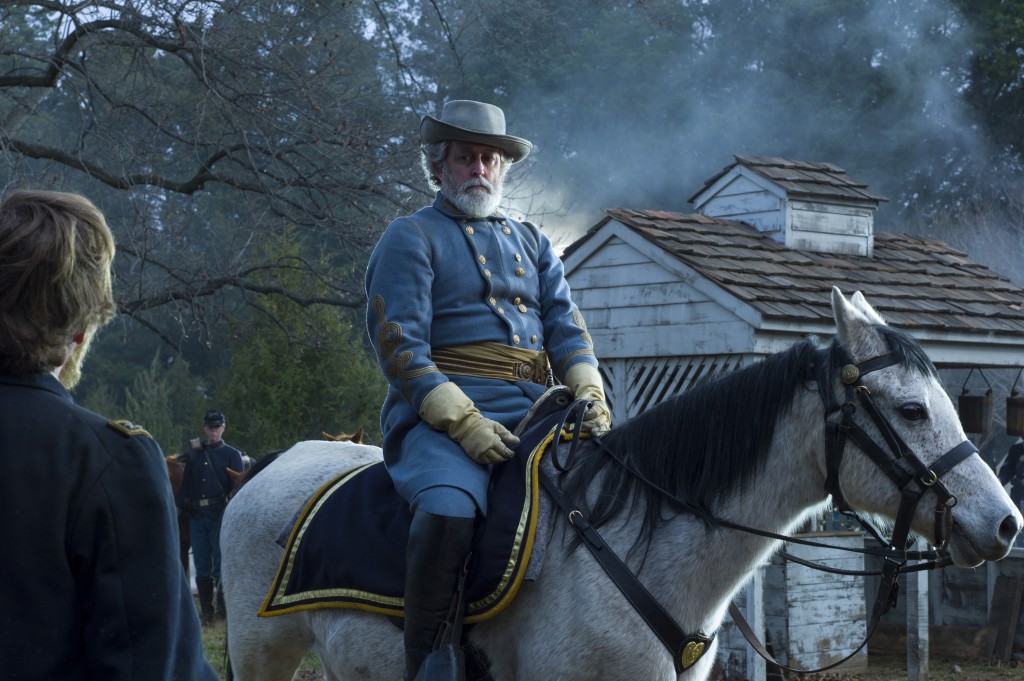You know the scene in Love Actually when Mark confesses his love to Juliet? The Juliet that is married to his best friend? He silently tells Juliet with hand-written signs that to him, she is perfect, and that he will love her for always. And then he walks away. And he says, “Enough. Enough now.” And my heart breaks– every time. Unrequited love, sigh. But at least it was over. Mark said what he needed to say and it was over. Because it’s a movie and not real, what happens after that truly does not matter, but it is my sincere hope that he found another true love; someone who loved him back in the same exact way.

But that’s not my point. Resolution is.
Oh my… how is she ever going to get to Appomattox?
I will. Don’t worry.
I got really into the Civil War for a while. I mean, I still think it’s completely fascinating, but for a while there I was like really far gone. (I don’t have interests per se, I have obsessions.)
My cousin Spruce recommended the Jeff and Michael Shaara father-son Civil War trilogy to me one time. I picked it up and couldn’t put it down. Then I couldn’t get it out of my head. Then I went to Gettysburg and was just floored. Absolutely in awe of what that time, that place, that horrific war must have been like. I can’t even imagine… but I try. And scenes tumble around in my brain pretty frequently.
One of the most striking things about my obsession was my complete 180 regarding General Robert E. Lee, commanding general of the confederate forces. Let me explain.
Twice upon a time, long before graduate school, I visited Arlington National Cemetery and learned about the yellow-ish house on the hill that had belonged to Robert E. Lee and his family before the Civil War. I knew little about Lee at the time, except that he’d commanded the Confederate Army, and in my black and white world, that was enough.

Robert E. Lee was a bad man and he deserved to have his land taken away. Better yet, he deserved to have it stand as a symbol of the horrors he wrought– I thought of Arlington National Cemetery as a sort of personal punishment for Lee as a result of his involvement with the Confederacy.
Oy, not so. Not so at all.
Granted, the Shaara trilogy is technically historical fiction, so many of the scenes are imagined, but it’s all based as much as possible in fact, and I learned that Lee was not nearly as one-dimensional, and definitely not as evil, as I had always pictured.
Lee was sick and tired before the war even started. Literally sick (cardiac issues, I believe) and tired of fighting in war after war. He was offered command of the Union Army first, but declined on account of his familial roots in the south and later took up command of the Confederate Army.
The battle details get somewhat fuzzy for me, I’m not good with the names and the dates and the details, but the feelings really stuck with me– the struggle, the futility, the exhaustion. Lee was absolutely sad. He did not like killing and he did not like ordering his men to their death. Yet, he was brilliant at it. And he did it all out of a sense of duty and honor and commitment, the likes of which was unparalleled. I think Lincoln even knew that, and I truly don’t think he held it against Lee personally.
As time wore on and on and the Confederate Army became more and more desperate for resources of every type, including and perhaps most importantly able-bodied men, surrender became inevitable. From what I understand, surrender was inevitable for a while and I can only imagine how painful it must have been for Lee to carry on knowing that every death past that point was for naught. So that brings us to my favorite scene: The surrender of General Lee to General Ulysses S. Grant, commander of the Union Army, at the Appomattox Courthouse on April 9, 1865.
Can you even imagine the relief? To know that it’s finally, truly, really over. I have to believe that even though it was surrender and not victory, it was probably past the point of even mattering. All that mattered was that it was over.
Sometimes, just seeing something out, getting to the end, is enough, no matter the outcome.
Both Lee and Grant handled surrender, defeat, and victory incredibly gracefully, in my opinion. I can only imagine the relief they both must have felt at that moment, just to know that the endless fighting could stop.
Have you seen the movie Lincoln? You should– it’s really good. It’s not actually about the Civil War, but rather about Lincoln’s efforts to get the 13th Amendment through Congress. Even though that’s the case, it’s practically impossible to not show the surrender of General Lee at the Appomattox Courthouse before showing the assassination of Lincoln (a mere 5 days later) and that is another respect in which the movie truly does not disappoint– it’s my favorite scene of the whole movie, even though it’s minor. I thought they did such a nice job of capturing the simplicity of the end and the relief felt by everyone.

Really, I’m not trying to relate anything in my life to that moment at Appomattox. And the parallel between the final moments of the Civil War and that scene in Love Actually is weak. But A is actually for Appomattox, and I got there, like I said.
Ladies and gentlemen: The Letter A.
A is for Attracting Attention which you did so brilliantly by opening with Love Actually.
Interesting info! I should read up more on the Civil War, I never put real thought into it because it was “boring” material in school. So many things we were learning in high school that I wish I could go back and RElearn now that I’m mature enough to grasp it!
I love the movie Love Actually, however now that particular scene just makes me think “Rick Grimes” (from The Walking Dead). Good for Andrew Lincoln for keeping his career relevant for so long! Lincoln- another connection within your blog!
I had such a good time with mom, you and Seth when we stayed at the bed-and-breakfast in Gettysburg and toured the battlefields. I’m glad you told me about the Shaara books. The battle of Little Round Top seemed so real when we were there even though it happened 150 years ago.